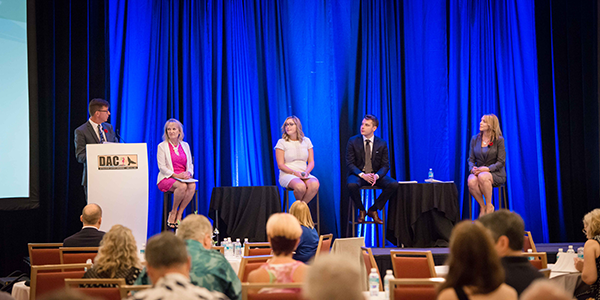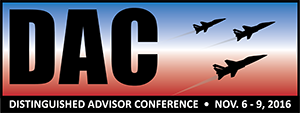Last updated: February 08 2016
The Next Generation Speaks: A DAC Panel Discussion

Knowledge Bureau and Manulife Investments, title sponsor of the Distinguished Advisor Conference and co-sponsor of the DAC Young Advisors Award, were delighted to announce last week the inaugural winners of this prestigious award.
The presentation was made to both Keeley Simpson, of Rorabeck Wealth Advisory Group, BMO Nesbitt Burns, and Brandon Silbermann, a financial advisor at Manulife Securities Investment Services Inc. and Don Stockman Financial Services Ltd.
Keeley and Brandon each received a scholarship to DAC 2015, which was held November 8-11, 2015 in Puerto Vallarta. These two talented young advisors also participated in a lively panel discussion on stage, which was a highlight of the event.
Representative of the millennial generation, Keeley and Brandon shared their perspective on this cohort, which is rapidly emerging as key customers of today’s financial services and the high-net-worth clients of the future. Understanding the millennial mindset, challenges, and priorities is key to thriving financial advisory practices in the future.
 |
Evelyn Jacks, President of Knowledge Bureau, introduced the panel and Barbara Foy-Pilchner, National Vice-President, Key Accounts, Manulife Investments, moderated the fascinating discussion. It’s clear from these two bright and articulate young advisors that we all have much to learn from their generation. Following are some highlights from the panel:
- Fully 84% of younger Canadians say they would not use their parents’ financial advisor. How will you bridge that multi-generational gap in your practice? Have you reached out to the kids of your top 20 clients?
- Technology is a huge disruptor in the industry going forward. For example, 72% of millennials would rather purchase financial products from Google and eBay than from their bank. How are you going to use technology to your advantage rather than letting it pass you by?
- As technologically savvy as they are, millennials actually tend to be more risk averse that other generations because they were in university or high school during the financial crisis of 2008 and they have been shaped by it.
- Financing is a big challenge for millennial advisors trying to buy books of business. Young people need to understand the magnitude of the commitment and so do the people close to them in their lives.
- Many advisors do not have a succession plan and are not proactive about bringing younger advisors into the fold. Brandon and Keeley, however, are integral members of advisory practices, part of a dynamic two-way knowledge transfer. Consider hiring young advisors to keep your practice vibrant and to position it for the future.
- In fact, many of your clients are concerned that their advisors are getting older and may not be around for much longer. To allay those worries and build some continuity for your clients, include younger colleagues in client meetings. When Brandon attends these meetings alongside more senior advisors, he uses his youth to his advantage, stressing to clients that he will be there for the long run. To build trust with the client, he also suggests that young advisors actively contribute in these situations, focusing on even just one specific thing about that client or situation that they can knowingly and confidently comment on—it’s a great way to get to know one another and begin the transition towards the future.
- Keeley stressed the importance of follow through—doing what you tell your clients you are going to do—and of remembering the personal details about their lives and families. Those things never go out of style and appeal to all generations.
- To cultivate multi-generational relationships with your clients and their families, pull the young advisors who work with you into the picture. You may just find that your top clients experience increased satisfaction if they know your younger colleagues are helping to take care of their kids’ financial interests.
- Keeley suggests making wealth management a family affair. For example, run joint seminars for your clients and their children, or develop a newsletter that focuses on the issues and needs of your younger clients. Of course make sure that the young advisors in your firm are part of these efforts.
- As the first generation to grow up entirely digital, millennials also have a great deal of knowledge to offer their more senior colleagues when it comes to technology. Brandon and Keeley emphasized the importance of LinkedIn for professional and client relationships, for example. Track the leads you pull in via LinkedIn, connect with your top clients on this platform, and ask them for permission to connect with others to whom they are connected. LinkedIn is a powerful tool for referrals and relationship building.
- There are still many practices today that do not even have a website—an essential for all advisors. Learn from the young people in your practice how to improve on this front. And don’t forget to make your website mobile compatible, as seven out of ten millennials are mobile-based.
- Millennial colleagues can help you get the most out of your website, too. They know all about using Google Analytics to track activity, find out how people got to your site, and more. And they know that 85% of visitors to your site will be attracted by the photos first, and that the second-most used page is “Contact Us.” Tap into this amazing source of knowledge that’s right within your practice (or should be) and learn from them.
- Many young advisors lack telephone skills because they are so used to texting, but for the bulk of the existing older client base, the telephone is still their preferred method of communication. Senior advisors can mentor their younger colleagues in this area. Conversely, older advisors need to be aware that younger clients often find phone calls annoying and frustrating. It’s important that all staff know how each client prefers to communicate, and to share their particular communication skills with each other to best serve their clients.
 |
It’s clear that the mentoring relationship with millennials is a two-way street. Do your practice a favour: Think long-term and bring young advisors on board to help ease transition planning and multi-generational client relationships. And remember to establish a support system to set younger advisors up for success—surround them with opportunities for mentorship and the best chance to succeed. If they are successful, your practice will continue to be!
The search for candidates for the 2016 DAC Young Advisors Award is already on. Application forms are available on the Knowledge Bureau website at the Conference Tab at www.knowledgebureau.com and can be submitted by young advisors themselves, their clients, employers, or mentors. The application process closes on May 31, 2016, and selection will be announced on June 15, 2016. The 2016 DAC will be held in San Diego, California, November 6-9, 2016. This year’s theme is SOAR HIGHER: Plan for your Greater Potential.





